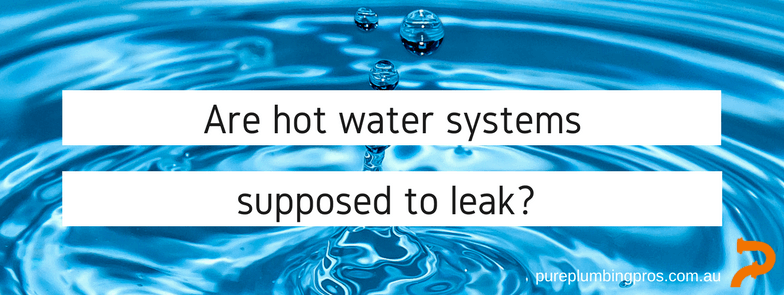Are hot water systems supposed to leak?

Water appearing from anywhere it hasn't previously can be alarming whether it's a pipe, tap or drain. Water leaking from your hot water system is not always cause for panic, but it definitely warrants a checkup to find out why.
Pressure release valve
The temperature and pressure release valve (TPR valve) on storage hot water systems is designed to let a small amount of water out when needed so it is not unusual for the occasional release of water from this location. A constant stream of water from the TPR could mean the valve is faulty and needs to be replaced or the valve is blocked with sediment.
Caution: Water leaking out of the hot water system can be very hot.
Other than the TPR valve water should not flow or drip out of the hot water system regularly.
Steady flow
Is the water gushing out? Time to take action.
Turn off the water inlet valve if the hot water system has one or the mains water tap if not, especially if the unit is located indoors or in an area in which water could cause damage. Remember if you have a storage hot water system there is still a tank full of water to come out even though you've turned the water off (depending on where the leak is). Layout some towels or place a bucket under the water flow if possible. Be careful the water could still be hot.
Turn off the power to the hot water system immediately:
- at the circuit breaker in the switchboard for an electric water heater
- at the gas valve near the unit for gas hot water systems
- consult the system manual for solar and heat pump hot water system shut down procedure
Safety warning: electricity and water can be a lethal mix, extreme caution needs to be used around your electric, solar or heat pump hot water system. If you are unsure or worried leave it and get profession help from your emergency plumber .
Slow leak
Even a slow leak needs to be reviewed by your plumber because it may be a sign of bigger problems to come. Book in a hot water repair as soon as you notice a drip or two from anywhere but the pressure release valve.
Possible causes of a leak
Corroded storage tank
The storage tank can become corroded over time, often from sediment build up inside the tank. Most tanks are protected by a sacrificial anode which is designed to corrode instead of the tank.
Ideally, the sacrificial anode corrodes and the tank remains intact, however, the anode needs to be checked routinely and replaced when needed. Sometimes this simple task gets overlooked and the tank begins to rust or corrode. Make sure your plumber checks the tank and anode regularly (every few years) to prevent this from happening.
Hint - Sometimes rust or brown coloured water, or a bad odour in the water is a sign that the hot water tank is beginning to corrode. Get your plumber to investigate a change in water colour or stinky H²0.
Damage to fixtures or pipes
The pipes or fittings on your hot water system can become corroded from contact with other metals or exposure to the elements over time. The good news is a leak from a pipe or fitting is often repairable.
Salty air
If you live near the beach the salty air can eventually cause corrosion in anything metal, including your hot water system. Routine servicing can help to keep on top of rust problems early.
Usually, a cracked or corroded storage tank is not worth repairing or even replacing, if the tank is damaged replacing it with a new system is often more cost-effective.
This is a good opportunity to upgrade to a more energy efficient model and reduce your power bills.
Hot water systems have come a long way in the last couple of decades, most brands offer 5+ star energy or very energy efficient options. Solar hot water or heat pump systems are a great choice as they utilise free, renewable energy sources.
Speak to your plumber for expert advice on the best hot water heater for your needs.
